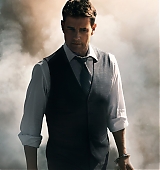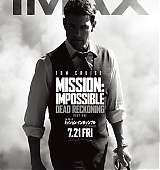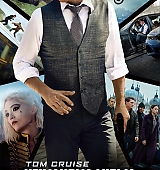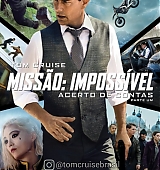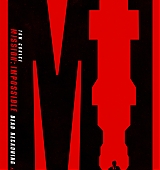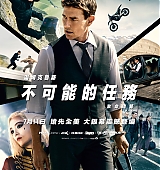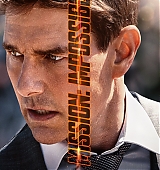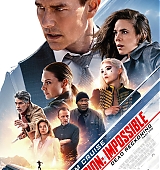The same movie critic that wrote the review for ‘Seattle Post-Intelligencer‘, Wiliam Arnold, also sat down to talk to Tom about ‘Valkyrie’. Here’s his interview:

A conversation with Tom Cruise
Playing a real hero may be just what he needsWhen the door opens and Tom Cruise enters the suite of Seattle’s Hotel 1000, it is with that distinctive whirl of charisma and seductive confidence that has made him the world’s biggest movie star of the past 25 years: killer smile, eyes that bore into you, the firmest of firm handshakes held for a few flattering seconds.
His hair is moussed back, and he’s dressed with casual elegance: jeans, Italian boots, a knit shirt with sleeves pushed up to his elbows. At 46, a few lines crinkle the corners of his famous face as he smiles, but he still looks so boyish he probably could get away with playing the lead in “Risky Business II.”
It’s the first week of November, and he has come to town to publicize his new movie, “Valkyrie” (which opened Thursday). Why so early? “Chris (McQuarrie, the film’s writer-producer) lives in Seattle, and we thought we’d give you guys the first crack at it. This is actually my first interview for the film.”
Even so, and even though the film — in which he plays a German officer who tried to assassinate Hitler — is a huge departure and career gamble, he admits he’s having “a hard time focusing” on what’s going on today because last night Barack Obama was elected president, and “everything else seems insignificant right now.”
“Katie (Holmes, his wife) called me from New York last night, and the cheering on the streets was so loud I could hear it over the phone in her hotel room. It’s amazing! It feels like a turning point in history, doesn’t it? A great, great new beginning for the country after all we’ve been through for the last eight years.”
As we take our seats and reminiscence a moment about his last Seattle visit (to publicize 2002’s “Minority Report“), he acknowledges that he, too, “could use a new beginning.” Despite his marriage and “a lot of joy” in his personal life, the past few years “have been a rough period in many ways.”
Rough, indeed. After two decades of unparalleled popularity, the world seems to have turned on Cruise over the past few years. Think of that uproar over his couch-jumping on Oprah Winfrey’s talk show. Or his being fired from his special relationship with Paramount because of “his behavior” and the poor box office of “Mission Impossible III.”
He’s been constantly under attack for his Scientology beliefs, especially after a clip of him espousing the religion wound up on YouTube, and his stance against psychiatric drugs made him the bad guy in a public conflict with friend Brooke Shields. When he went to Germany to film “Valkyrie,” much the country wanted him to stay away.
Still, he doesn’t see himself as any kind of victim. “I made some mistakes, and I didn’t handle some situations very well. I’ve learned some valuable lessons from all these experiences. Has it made me cynical? Absolutely not. But, yes, it’s made me more cautious. … In the age of the Internet, you have to be more careful.”
Cruise seems willing to discuss these unpleasant matters, but he’s also noticeably uncomfortable with the subject. What he really wants to talk about is “Valkyrie.” He admits he’s nervous about the film and — since I’m one of the first critics to see it — he wants to know what I thought of it.
When I tell him I thought it was pretty terrific — the most nail-bitingly suspenseful movie I’ve seen all year — he makes a fist, shakes it in the air and gives out an enthusiastic “Yessss!” that startles me. For a moment, I think he might jump on the couch, but instead he just beams and says, “Well, that’s music to my ears.”
“Valkyrie” tells the story of Col. Claus Von Stauffenberg, the aristocratic German Army officer who tried to rid his country of the Nazi leadership in a complex plot that included a July 20, 1944, assassination attempt on Hitler by planting a bomb in one of his high-level strategy sessions.
“We’ve tested the movie and have a certain amount of confidence in it. But it’s a challenge to keep an audience in a state of suspense when they basically know the outcome of the story — that, you know, Hitler ultimately didn’t get assassinated. And you never know for sure how a movie is going to play to critics.”
The film is the second Cruise has produced under the United Artists banner since he took over the moribund movie company in 2005. The first, the 2007 anti-Iraq war drama “Lions for Lambs,” bombed badly, but Cruise says its failure didn’t “deter his commitment” to make the new UA synonymous with important, prestige movies.
He admits that when the script of “Valkyrie” came to him, he’d never heard of Von Stauffenberg and didn’t know there had been a significant anti-Nazi German resistance in World War II. “But I love history, and I’ve read a lot about the Third Reich and the drama of the man’s quest just really appealed to me from the start.
“It hit me that Von Stauffenberg was an authentic hero … and that his special kind of heroism was worth examining. Movies, of course, are full of heroes and I’ve played a few of them myself. But, while this action-movie (bravado) is fun, it’s not real. It doesn’t give us an honest portrait of a genuinely heroic life.”
Cruise says he tried to play the character with “no phony courage,” as a man dedicated to “his task … risking everything — including the fate of his wife and children, and the certainty of being branded a traitor to his country — because he knew it was the right thing to do.”
As he elaborates, it’s apparent that he identifies with Von Stauffenberg on some personal level that he can’t quite verbalize. And it strikes me that what he’s saying about the man’s character is very similar to what he wrote in his eulogy for his friend Paul Newman in People magazine shortly after the actor’s death.
When I point this out and the conversation shifts to Newman, something comes over Cruise: His manner relaxes, his face brightens and his eyes tear up. He says, “Paul lived with such dignity and left such a legacy — as an actor and a philanthropist — that words can’t do justice to his accomplishment.”
Growing up, Cruise suffered from dyslexia, felt abused in several ways and later told at least one interviewer his own father was a “bully.” And it’s clear that Newman (“He used to call me ‘Cruiser’ “) was a cherished father figure for him — to the point where he’d be happy to sit here all day and talk about him.
Stardom, he says, is an “unnatural” thing to happen to a human being. Most stars “haven’t handled it well” — and plenty “have been destroyed by it.” But “think of Paul’s life. He had a successful marriage, he did great work and he made the most of the responsibility his (superstar status) gave him to do good things for the world.”
Is it important for Cruise to have a role model? “It is, yes. When things get tough — as they invariably do for everyone — we need to be able to look at another person who’s gone before us and draw inspiration from the way he handled his difficulties. Having someone like this in your life is a gift.”
As his publicist enters the room to signal my time is up, Tom Cruise seems to have a small epiphany.
“Now that I think about it,” he says with a smile, “this idea is probably one of the reasons that made me want to make ‘Valkyrie.’ Like Paul, Von Stauffenberg is a good role model. So I guess you could say that both men have been a gift to me.”
THE ESSENTIAL TOM CRUISE
10 films that define his career:
RISKY BUSINESS (1983): Cruise had appeared in four movies by this time (including “Taps” and “The Outsiders“) but it was this most original and inspired of ’80s teen comedies — about a boy who runs amok while his parents are out of town — that made him an instant star.
TOP GUN (1986): As a maverick aviator-trainee who aspires to be the Navy’s top fighter pilot in this over-prduced Don Simpson-Jerry Bruckheimer barnstormer, Cruise honed his image as the epitome of broad-smiling, super-confident, testosterone-loaded ’80s cool.
THE COLOR OF MONEY (1986): In this sequel to 1961’s “The Hustler,” Cruise played the hotshot pool-table protégé of Paul Newman’s Fast Eddie Felson and found in Newman a mentor and father-figure who would become one of the most important influences on his life.
RAIN MAN (1988): Just about everyone involved with this poignant drama but Cruise seemed to win an Oscar for it but, as numerous critics have noted in hindsight, it’s Cruise’s steady performance as the autistic hero’s younger brother that is the rock of the movie.
BORN ON THE FOURTH OF JULY (1989): Cruise won his first Oscar nomination — and new industry respect — for his wrenching performance as disabled Vietnam vet Ron Kovic in this second installment of Oliver Stone’s Vietnam Trilogy (between “Platoon” and “Heaven and Earth“).
A FEW GOOD MEN (1992): Cruise showed the world he could handle a dialogue-driven drama as well as any Broadway-trained actor in this riveting courtroom drama, based on a play by Aaron Sorkin about a U.S. Navy lawyer defending two Gitmo Marines accused of murder.
MISSION: IMPOSSIBLE (1996): Cruise wet his feet as an executive producer and broadened his marquee power by establishing himself as a franchise-action star in this first and best of the three films his company adapted from the ’60s TV spy series.
JERRY MAGUIRE (1996): Cruise received his second best-actor Oscar nomination for his title performance in Cameron Crowe’s irresistible romantic comedy about a sports agent (“Show me the Money”) who has an attack of honesty after suffering a nervous breakdown.
EYES WIDE SHUT (1999): Cruise won his third Oscar nomination in ’99 for his supporting role in “Magnolia,” but being picked that year to star in Stanley Kubrick’s last film — playing a New York doctor who enters a world of sexual adventure — was even more of a status booster.
COLLATERAL (2004): With 2003’s “The Last Samurai” and this dark Michael Mann-thriller — in which he plays a cold-blooded hit-man — Cruise entered his 40s with two roles that said goodbye to his boyish persona and embraced a future of conflicted, mature anti-heroes.
(Source: William Arnold for Seattle Post-Intelligencer)
